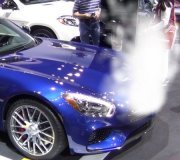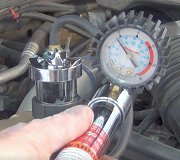First of all, removing the thermostat is not a good diagnosis procedure especially if you are climbing a hill. I can take a 2011 vehicle, remove the thermostat, and it will also overheat climbing a hill, especially when you are going up a high elevation. Some people actually do not now the importance of a thermostat and it's function. When you remove the thermostat the water or coolant (whatever you have in there) just keeps circulating constatly. So when does the water cool? You may say the radiator's job is too cool it? Correct but when does it cool it? Well that is where the thermostat comes into play. The thermostat starts off closed and there is a reason why. The engine needs to heat up pretty quick so that other sensors and the CAT start to function properly. Once the engine starts to get hot, the coolant in the block starts to absorb the heat. When it reaches the temperature that the thermostat is suppose to open at say 180 degrees, it will open and let the cool coolant from the radiator in to the engine block while the hot coolant from the engine block is sent to the radiator. Once the cool coolant reaches the block and starts absorbing the heat from the block, the thermostat closes and now gives the hot coolant in the radiator time to cool off. Once it is cool and the coolant in the block absorbes the heat and the temp reaches our example of 180 degrees, the thermostat opens up once again and the hot coolant from the block goes too the radiator and the cool coolant from the raditor goes to the hot block to absorb the heat and the cycle repeats itself over and over again. If you have no thermostat, when is the coolant suppose to stay in the radiator long enough to cool down? It will not and it will cause you to over heat. Install a new thermostat and start from scratch again.
If you are over heating you may be hearing a pinging sound from pre detenation, meaning it is so hot, the gas is already igniting before the spark plug ignites it. So before the power stroke, the fuel is igniting during the compression and you are hearing the explosion when both intake and exhaust valves are closed. So the real question now is, when does your vehicle actually over heat? Are the fans coming on when they are suppose too? Are you running low on coolant? If you are running low on coolant where is it going? Do you see an external coolant leak? Let me know what you find after you install a new thermostat?
SPONSORED LINKS
Sunday, October 31st, 2010 AT 1:03 AM



